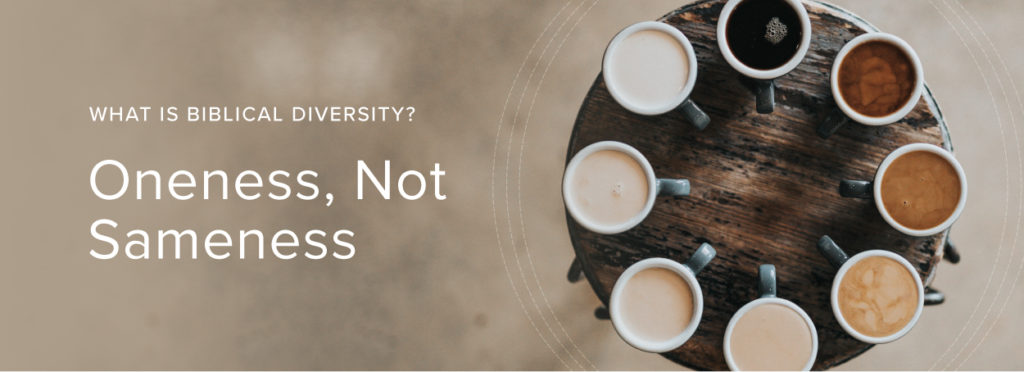.by Dr. Doug Logan, Jr.
What is Biblical Diversity? Oneness, Not Sameness.
Diversity. Some lament the lack of it, while others think we’ve got plenty. We want to know: how do we get it; do we need more of it; do we have enough of it; what exactly is it?
Christians aren’t immune to the confusion. The world’s undersized view can influence us. But the gospel creates a rich, compelling, and radical diversity that melts our hearts and compels our praise. God’s Word expands our understanding of both diversity and unity.
A bigger diversity
We must not truncate diversity into categories of just ethnicity. Biblical diversity that is wrought by the gospel is so much bigger and more beautiful than that.
After this I looked, and there was a vast multitude from every nation, tribe, people, and language, which no one could number, standing before the throne and before the Lamb. They were clothed in white robes with palm branches in their hands. —Revelation 7:9 (CSB)
This “vast multitude” is not monolithic. Imagine the variety of physiques, skin colors, hair textures, eye shapes, smile sizes, food preferences, languages, senses of humor, tones of voice, manners of praise . . . all gathered together! It will be a noisy, colorful, fragrant multitude of every ethnicity and cultural group in God’s big world.
Diversity is not peripheral or accidental but central to God’s design. It is part of the ontology—the being and essence—of humanity. Diversity exists from the beginning as God creates the first man and woman; for humans to obey God’s creation mandate, they must be diverse (Genesis 1:26–28). During the fall, God does not obliterate diversity and does not destroy individuals or ethnicities (Genesis 1–3). At Babel, God further sparks diversity by confusing languages and causing people to scatter (Genesis 11). The international church in Antioch was beautifully diverse, and a key missionary sender (Acts 13:1–3). The Bible reveals a God who nourishes diversity and gathers diverse peoples together in union with Christ.
We diminish the comprehensive reconciliation God creates through Christ when we reduce diversity to ethnicity only.
There’s no “white church” or “black church” in the New Creation. Even today’s predominantly white or black churches are not monolithic, but full of diversity in background, education, and socioeconomic status. Diversity is not just about ethnicity, although that is a massive part of what God is speaking of in Matthew 28:19 as Christ gives the command to make disciples of “all nations” (panta ta ethne). Yet diversity to all nations opens up reaching all different types of people within the same ethnic group. So when we think about diversity, we should widen our view. It can clearly be about people being single and married, male and female, rich and poor, young and old, Jew and Gentile, black and white. Hear what Dr. Tony Evans says about the oneness of Christians:
“We fail to embrace a oneness perspective rooted in kingdom theology, though, unless we, like Joshua, surrender to the truth that God’s kingdom is not here to take sides. God’s kingdom is not black. God’s kingdom is not white. God’s kingdom is not Hispanic. Nor is it Asian, Middle Eastern, or Indian. God did not come to take sides. God came to take over.
In the world differences divide, diversity is weak. But in Christ, differences only highlight more of our Savior’s reconciling power. Biblical diversity is expansive and robust.
A bigger unity
As for me, if I am lifted up from the earth I will draw all people to myself. —John 12:32 (CSB)
Jesus is the redeemer of lost people from all peoples:
But you are a chosen race, a royal priesthood, a holy nation, a people for his possession, so that you may proclaim the praises of the one who called you out of darkness into his marvelous light. Once you were not a people, but now you are God’s people; you had not received mercy, but now you have received mercy. —1 Peter 2:9-10 (CSB)
God doesn’t obliterate tribes, yet God’s gospel obliterates tribalism. He creates one people from all peoples—submitted to Christ Jesus, filled with the Holy Spirit, and united to fill the world with the gospel.
Jesus gets all the glory. He doesn’t take all the crayons in the box, melt them together to make some funny brown color, and call that diversity. God, the artist uses all the colors individually to make one beautiful mosaic of redeemed people, glued together by grace.
I want to be very clear. Heaven will not be a gathering of homogeneous people. The book of Revelation records Heaven as a standing room only, eternal worship gathering of the myriad (all nations, tribes, and tongues) of which all would be redeemed and glorified by Christ alone. What a day of rejoicing it will be. To this point, the brilliant speaker and author Trillia Newbell said, “We won’t fight against racism or wonder how to build diversity. We will be diverse. We will love completely and fully. We will worship together and enjoy one another for all eternity.” How extraordinary a truth eternal diversity will be.
This stunning unity is unique to the work of the Holy Spirit. No system, government, or social agenda can accomplish it. We are individual image-bearers blazing in distinct technicolor, eternally united. We are not the same, but we are one.
Dr. Doug Logan, Jr. is an Associate Director for Acts 29 and the President and Dean of the School of Urban Ministry at Grimké Seminary. In 2011, Doug and his wife Angel planted Epiphany Fellowship in Camden, New Jersey. They have three sons & three grandchildren. He is the author of On The Block, Developing a Biblical Picture for Missional Engagement.
1Tony Evans, Oneness Embraced: Reconciliation, the Kingdom, and How We are Stronger Together

